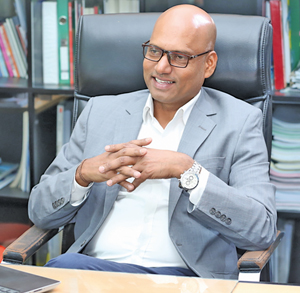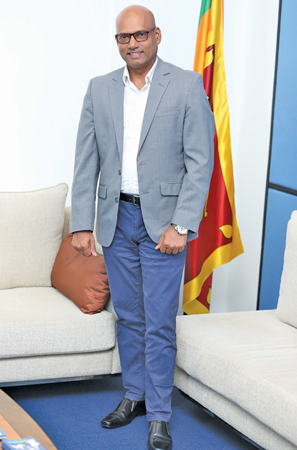Dheera Hettiarachchi is head of two very important Tourism entities. He is Chairman Sri Lanka Institute of Tourism & Hotel Management and Chairman of the Sri Lanka Convention Bureau.
Having graduated from the Rajarata University of Sri Lanka in Travel & Tourism Management and armed with a Post Graduate Diploma in Tourism, Economics & Hotel Management from the University of Colombo, Hettiarachchi has thus been immersed in the subject of Tourism from a very young age. This then is how he took to the Industry and then to the very positions he holds now, rather effortlessly and sits easy on the job.
Although initially Hetiarachchi commenced his career as an Educator/Counselor of SOS Children’s Villages, it was after he joined the Sri Lanka Tourism Development Authority (SLTDA) as a Development Officer in 2005, that he discovered that it is indeed the subject that he fully focused on in his studies that his true calling lay, and swiftly rose up in the ranks as Assistant Director in the division of Standards & Quality Assurance at SLTDA.
Thereafter he headed towards the Sri Lanka Institute of Tourism and Hotel Management as a Lecturer on Travel& Tourism and also functioned as its Cluster head since 2021.
 In the role of a Tourism Development Expert his work on a few projects with the Department of Wildlife Conservation (DWC) to develop and manage the Wilpattu National Park and its influence zone for sustainable utilization is note worthy. The Project to Develop Master Plans for Identified Lagoons; Arugambay and Panama in Eastern Province, under the Ministry of Fisheries and Aquatic Resources Development was yet another that he fulfilled his tasks successfully.
In the role of a Tourism Development Expert his work on a few projects with the Department of Wildlife Conservation (DWC) to develop and manage the Wilpattu National Park and its influence zone for sustainable utilization is note worthy. The Project to Develop Master Plans for Identified Lagoons; Arugambay and Panama in Eastern Province, under the Ministry of Fisheries and Aquatic Resources Development was yet another that he fulfilled his tasks successfully.
He has served as a Visiting Lecturer for many State and Private Sector Universities including the University of Colombo, University of Kelaniya, Rajarata University of Sri Lanka, The Management and Science University, and the Australian College of Business and Technology (ACBT), and covered subjects correlated to Sustainable Tourism, Community-Based Tourism, Hospitality Management, Tour Guiding, Strategic Planning, Eco-Tourism, and Events Management.
Hettiarachchi is presently an active member of the National Tourism Policy Formulation Committee and currently serves as a member of the Tourism Advisory Committee.
Q. You have been entrusted with a key role that is seen as one of the main providers to Tourism’s growth. More marketing means more arrivals and that means we require more manpower. Especially when there is aggressive marketing and an ambitious target for arrivals, are we able to meet the demand with the human resources?
A. The Sri Lanka Institute of Tourism and Hotel management established under the tourism act no 38 of 2005, under the theme ‘taking Sri Lanka to Global heights’ is for just that, it’s a place to start off a journey towards excellence in Sri Lankan hospitality.
Our identity reveals that it is the oldest and premier government institution of Hotel Management and Education since 1964. There is no doubt that it is the most sought after institute for Tourism and hotel management Education, being also the only educational institution in Sri Lanka that the most practical training for Hotel Management.
We currently have courses that covers-; Craft level, Management Diploma in Hotel and catering operations, the National Diploma in Hospitality management, pastry and bakery programme, chauffer tourist guide course and national tourist guide course. provides Having all that we are packed to capacity in the conduct of these courses in the 9 provinces. However this is inadequate.
Currently the hospitality workforce stands at about 429,000 and with the 3 million tourist arrival target this year, we will require the least 600,000, therefore there is a shortfall of 171,000 of human resources.
There has been a number of youth migrating too, seeking greener pastures. This is also a reason for the dearth of people in the field.
Q. You had been a lecturer at the Institute for several years, you would know even better as to the system in which it works. How many apply for the courses and what is the intake per year for training?
A. There are thousands of applications but the intake is to the capacity that the institute can take which is limited. 5,500 students in total per year are selected upon a placement test/examination. We need more lecturers. And we need more buildings.
Q. What are the steps you have taken so far since you took over from being lecturer to Chairman at the Institute, last year?
A. The present Government believes that development of the Human Resource is the key and vital factor in tourism development. Human Capital Development is one of the key pillars of the Tourism policy of the government. It is expected to increase the existing workforce (429,641 employees -Direct and indirect) to 800,000 employees to cater to 4 Mn forecasted tourist arrival targets within the next 05 years as per the strategic direction of the government’s Tourism Policy.
 First and foremost we need to increase the intake, therefore we require to double up the intake. This will commence next month. Further, we hope to expand the capacity in all 9 provinces. For now we will double up the intake by conducting the classes in the same premises, with one batch in the mornings and another batch in the evenings. We have identified and outlined areas for implementation and the process has started and we have made much progress thus far, but there is a lot to do.
First and foremost we need to increase the intake, therefore we require to double up the intake. This will commence next month. Further, we hope to expand the capacity in all 9 provinces. For now we will double up the intake by conducting the classes in the same premises, with one batch in the mornings and another batch in the evenings. We have identified and outlined areas for implementation and the process has started and we have made much progress thus far, but there is a lot to do.
Q. What more do you require to double up the intake? Have you sought assistance?
A. We require buildings and partnerships. I am having discussions on this at district level to get assistance in getting buildings to expand the conduct of the courses through Ministries, Departments and the provincial Governors of Provinces.
Q. What other plans do you have in advancing the educational standards in hospitality?
A. Next year we are going to introduce a degree programme on Hotel and Resort management.
This would be a first for the institute. We have already obtained the degree awarding status, the UGC approval. We hope to commence the first batch next year.
This would attract more students not only from Sri Lanka but our intention is also to attract students from the Maldives so that it will generate revenue too in the meantime.
Q. Have you sought donors or funders to assist you? What kind of assistance have you indicated?
A. We have sought assistance both in Financial and Technical from the willing Donors in order to develop and increase the human capital requirement for tourism and hospitality industry of Sri Lanka.
Yes, we are now engaged in discussions in that direction with even agencies like the ADB and the World Bank. We have approached a University in China too for accreditation to a foreign university.
Q. What has been identified as the requirements viz a viz the current Govt.’s Tourism policy and a realistic grounded analysis on human capitol development?
A. As per the National Level Survey on Human Resource Requirements and Training Need Analysis (TNA) in Tourism & Hospitality, it has been identified that presently Sri Lanka Tourism is facing a significant challenge. Specially lack of statistics on existing and required human resources. Sri Lanka tourism faced multiple crisis situations since 2019.
Significant number of tourism workforce has migrated or switched their professions to other sectors. Therefore, the human capital requirement of tourism sector for the next 05 years needs to be identified scientifically by a comprehensive survey along with the industry stakeholders’ support. i.e Hoteliers, Bartenders, Tour Guides, Categories of MSMEs, Tourist Drivers, Travel Agents, Tourist Activity Organizers, Trekking and Hiking Guides etc.
Based on the same, the gaps in the industry will be identified and tourism training and education will be re-designed and strengthened through the diversified courses such as Professional cookery, Housekeeping, Front office, Food & Beverage, Pastry and bakery, Professional Tour Guiding, Events Management etc.
It is expected to obtain the involvement of National Universities who offer Tourism and Hospitality Degrees in this regard and conduct a comprehensive survey in collaboration with Tertiary and Vocational Education Commission (TVEC), and other related Training stakeholders.
Q. Is the SLITHM not thinking of expansion in its operations from provincial level to District level?
A. The capacity of SLITHM is restricted by no of trainers/Lecturers and Physical resources island wide. The government has identified to expand its; capacities from Provincial levels to feasible District Levels to cater to the future human capital needs of the country. i.e. Colombo, Jaffna, Sigiriya, Hatton, Kataragama, Galle, etc. Which is consisted with Human Resources including qualified Lectures and Infrastructure development.
Q. What are the other areas you have identified that we lack when it comes to your plans for development of human capitol?
A. Steps are being taken to emphasize the Research and Development (R&D) in tourism and hospitality. It is proposed to establish a “National Tourism Research Forum/Center” in Sri Lanka. Individuals and academic institutions are invited to professionally engaged in research and development. Applied researches will be encouraged to develop the tourism industry.
SLTDA, SLITHM, National/Private Universitas and Donors are expected to come to a one platform in this regard. National and Private sector Universities offering Tourism and Hospitality related Degrees will be connected to the Tourism development process of the country. Tourism Product development needs and training needs (such as Wellness tourism, culinary tourism, Eco-tourism, Community Based Tourism, etc.) to be fulfilled through the applied researches of the universities and other institutions. In the long run, this initiative could be expanded to a “National Tourism Research Center”as a specific institution under Sri Lanka Tourism.
Q. We are far behind in terms of digitalization in general, how do you see the Process Mapping and Digitalization of Services (Internal and External) of SLITHM?
A. SLITHM is of the view of establishing an effective process mapping for each and every department and digitalize the entire operation of SLITHM such as Students Management System (SMS), Learning Management System (LMS), Store Management, Human Resource Information System (HRIS) etc.
This need to be connected with the Government Policy on digitalization. Therefore, this particular task can be connected with all 04 institutions under the tourism umbrella.
Q. I understand that there is a “Hospitality Multitasker” Franchised Training Program in the works by SLITHM ?
A. Yes, this program is identified as an alternative approach for the existing restrictions (Lecturers and Physical resources) available at SLITHM to train more youth to the industry. On the other hand, it believes that MSME sector is contributing about 65% to the tourism sector by various ways. This Hospitality Multitasker program is designed to cater to small and medium businesses such as homestays, guest houses, Travel Agents, Activity organizers, etc in collaboration with public and private training institutions.
School levers willing to start new tourism businesses, Owners/Managers of existing tourism businesses and employees of the small properties are the target audience of the program. This program is covering 360 hours and NVQ Level3 certification.
It expected to obtain a funding support for per heed for the Franchisee institutions as an encouragement. In this regard Samurdi development department has already partnered with SLITHM.
Q. Are you satisfied with the academic staff of SLITHM, if you can enlighten us on the aspect of Capacity Development of Academic Staff of SLITHM?
A. Of-course. They are doing wonderful job although facing many challenges. At the same time, it is an important task to develop the capacity of the academic staff of SLITHM in terms of the novel knowledge and skills in disciplines such as Tourism, Front office, Housekeeping, food and beverage, Pastry and Bakery and professional cookery.
The up dated pedagogic practices are really needed for them to teach the modern practices to the students of new generation. However, this requirement has not been addressed for a considerable period. It is recommended to provide an international/local exposure training for each discipline of the academic staff.
Q. What about gender parity? Do you believe in Increasing of Female cadre in Tourism and Hospitality?
A. Female participation in tourism will be emphasized and special programs will be designed to attract more female to the industry. Before the COVID the global tourism sector contribution made by female was considered as 54% as per the UN Tourism. Unfortunately, Sri Lankan female contribution is about less than 10%. Hence it is a national responsibility to attract more female in to the industry. Special marketing and promotion campaigns need to be established in this regard.
Q. I understand that a National Tourism Incubator Program – NTIP is in the pipeline? Can you elaborate on this?
A. NTIP will be established to train, educate and develop and nurture new and existing Micro, Small and Medium sector Entrepreneurs (MSMEs) in Tourism in Regional and provincial levels. E-tourism and digital platforms will be highly emphasized in this regard.
SLITHM, SLTDA, Provincial Tourism Authorities. Banks and Donor agencies will be partnering together for this task. It is expected to deliver the tourism knowledge via online and subsequent training program will be conducted by the Provincial Tourism Authorities to the participants. The services of the Banks are expected to obtain by providing low interest development loans for their business growth. At the same time this program will support to formalize and reduce the informal sector tourism enterprises in Sri Lanka.
Creation of Digital platform and fulfilling of the training needs in Provincial levels for the MSMEs are the requirements where donors’ assistance required.
Q. What about Community Based Tourism (CBT) Training and Product Development Programs?
A. CBT is an alternative and sustainable tourism segment in the world and there are many community approaches are available in Sri Lanka as well (Hiriwddunna, Ethiliwewa, Heeloya, Panama, Mandaramnuwara, etc) It is proposed to inline them with a common format and signify their uniqueness while empowering the communities with their livelihoods.
A CBT training program has been designed in this regard by SLITHM and proposed to collaborate with SLTDA, Provincial Tourism Authorities for the CBT product development. The holistic idea of this is to establish unique, diversified and standardized CBT product range in Sri Lanka owned by the community members (CBOs) as new experiences to the tourism industry. (Village Tours, Traditional fishing, Agriculture, Indigenous medicine, Traditional culinary experiences, etc)
In this regard, a training and product development funding support is expected by Donor agencies.
Q. Has anything being planned at school level and any new courses to be introduced through SLITHM ?
A. SLITHM has established “Tourism Club” network within its operational system and willing to expand the same to the school level. It is expected to develop a future professional in tourism and good traveler through this program. The objectives of the program can be aligned as: Tourism education and awareness, Training and development, CSR and Sustainability, Partnerships and networking, etc.
SLITHM provincial Collages island wide can implement this project in a sustainable and effective manner.
Further to this, the Hospitality sector programs of the SLITHM (specially Certificate programs in Front Office, Housekeeping, Food and Beverage, Professional Cookery) are to be mapped with the NVQ levels as a vocational requirement of the country.
With discussions held with academic staff of SLITHM and TVEC, it has been identified two courses namely: 1) Accommodation Management 2) Culinary Operations and Food and Beverage Management as NVQ Level 5 and 6 programs for future implementation replacing the certificate level courses. Based on these mapping the past students too can obtain the NVQ certification, However the curriculum development and mapping is an important task to fulfill with in the second quarter of the year 2025.
Q. Do you not feel that even with the degree programme that you plan to introduce, that Sri Lanka lacks courses for professional Training, and the number of training institutes, inadequate currently?
A. It has been proposed to establish an “Advance Professional Training Institute for Tourism” under the Sri Lanka Institute of Tourism & Hotel Management as a Private Public Partnership (PPP) to cater to the hi-end tourism markets/Careers namely; Adventure tourism (Sky, Water and Land based), Sommeliers, Butlers, Wine Tasters, Tourist Interpreters, etc. It is expected to establish this initiative as a Private Public Partnership (PPP) along with national and international tourism training stakeholders.
Q. Finally what more do you need support for and from, in your plans to improve the human resources sector through the institute to contribute to the growth of tourism in the country?
A. All stakeholders in Tourism need to unite to ensure that every aspect can be fulfilled in the tourism training sector. We look forward to having what has been impeccably planned, all those that we discussed, to see through to its fruition so that we will be geared with the human capitol to serve all of our guests well and reach the targets set to make Sri Lanka’s tourism industry a vibrant and thriving one and be the main source of revenue to the country soon.







